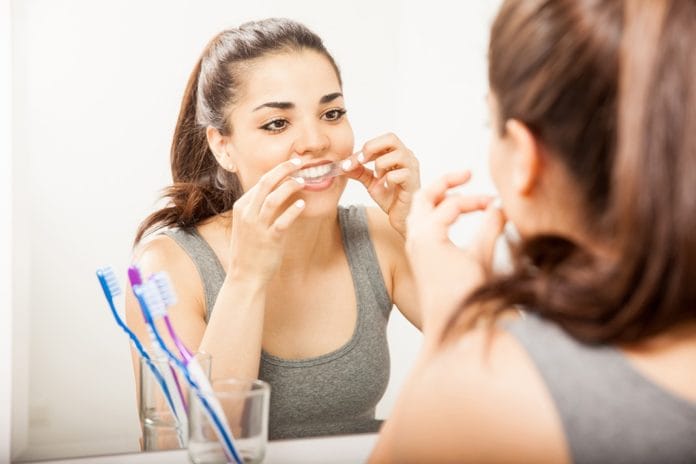Teeth whitening is a billion-dollar industry. People from all over the globe routinely buy teeth whitening products with the hopes that it will remove stains and make their teeth appear brighter. Now there is new research that suggests teeth whitening products can potentially damage a patient’s smile. The study, titled “Teeth whitening products can harm protein-rich tooth layer: Researchers show active ingredient in whitening strips damages dentin,” was presented at the recent Experimental Biology conference.
Background Information about Dentin and Teeth Whitening
The tooth is comprised of three different layers: enamel, dentin, and pulp, plush the surrounding tissue that connects the roots to the gingiva. The enamel helps protect the underlying layer of dentin tissue inside which is filled with collagen and other sensitive tissues.
Hydrogen peroxide is a popular ingredient in teeth whitening products since it can oxidize the proteins inside the layer of dentin. The ingredient makes up 14 to 15 percent of most over-the-counter whitening strips, although weaker concentrations are available.
Patients who want an even stronger teeth whitening experience can visit a dental professional to get their teeth whitened with products that have up to 30 percent hydrogen peroxide. Some people experience tooth sensitivity after using the product due to its oxidizing effects on the teeth, although it can vary based on the person.
About the Study
Researchers from Stockton University in New Jersey presented research examining the effects of tooth whitening on dentin at the American Society for Biochemistry and Molecular Biology during the annual Experimental Biology meeting in Orlando, Florida. The American Society for Biochemistry and Molecular Biology (or ASBMB) is a nonprofit organization with over 10,000 members who work in the scientific and educational field. An estimated 15,000 scientists and members of the nonprofit organization attend the yearly Experimental Biology event. The conference displays a wide range of exhibitions from the brightest minds in the industry from across the United States.
The group of researchers, who are undergraduates at the university, worked under the direction of Kelly Keenan, Ph.D. Keenan is an esteemed associate professor of chemistry at Stockton University. She decided to conduct the study once she noticed the lack of research examining the effects of whitening strips on dentin instead of tooth enamel.
For the study, the researchers examined how hydrogen peroxide can damage the protein-rich dentin tissue underneath the tooth’s enamel. Keenan and her team looked at how dentin is slowly chipped away into small fragments when treated with the ingredient. They discovered that hydrogen peroxide irritates the fibers inside dentin, which makes the tooth more sensitive afterward. Eventually the collagen protein inside dentin can fade away with increased exposure.
The undergraduate researchers also decided to study what would happen when pure collagen was treated with different amounts of hydrogen peroxide. After mixing the two, they analyzed the results with a gel electrophoresis laboratory technique and observed the proteins break down over time.
Keenan came to the conclusion that while short term teeth whitening won’t cause prolonged damage to someone’s dentin, frequent teeth whitening may damage it. She would like to further investigate the damage associated with tooth whitening products and whether the collagen in dentin can repair or self-regenerate over time. She would also like to see whether hydrogen peroxide has the same impact on other proteins.
In Conclusion
Dentists and dental hygienists must counsel patients on the potential dangers of whitening their teeth too often. They should also discuss the limitations of teeth whitening products with them so they won’t have unreasonable expectations. Overall, dental professionals can help their patients understand the importance of developing good dental hygiene habits like using fluoride toothpaste, cleaning interdentally, and visiting their dentist/dental hygienist regularly to help improve their smile.











